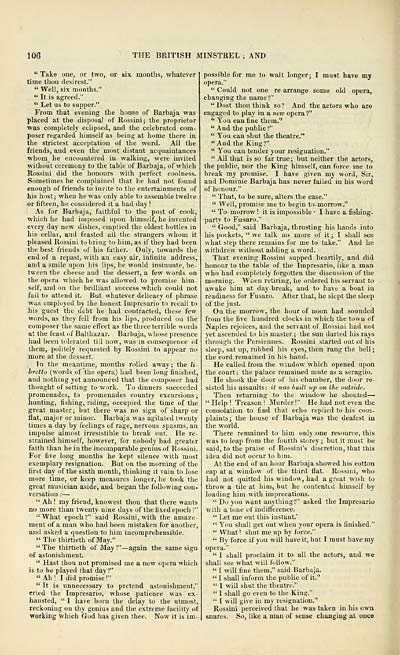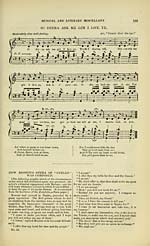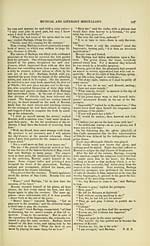Glen Collection of printed music > Printed music > British minstrel, and musical and literary miscellany
(444) Page 106
Download files
Complete book:
Individual page:
Thumbnail gallery: Grid view | List view

106
THE BRITISH MINSTREL ; AND
" Take one, or two, or six months, whatever
time thou desirest."
" Well, six months."
" It is agreed."
" Let us to supper."
From that evening the house of Barbaja was
placed at the disposal of Rossini; the proprietor
was completely eclipsed, and the celebrated com-
poser regarded himself as being at home there in
the strictest acceptation of the word. All the
friends, and even the most distant acquaintances
whom he encountered in walking, were invited
without ceremony to the table of Barbaja, of which
Rossini did the honours with perfect coolness.
Sometimes he complained that he had not found
enough of friends to invite to tbe entertainments of
his host; when he was only able to assemble twelve
or fifteen, he considered it a bad day !
As for Barbaja, faithful to the post of cook,
which he had imposed upon himself, he invented
every day new dishes, emptied the oldest bottles in
his cellar, and feasted all the strangers whom it
pleased Rossini to bring to him, as if they had been
the best friends of his father. Only, towards the
end of a repast, with an easy air, infinite address,
and a smile upon his lips, he would insinuate, be-
tween the cheese and tbe dessert, a few words on
the opera which he was allowed to promise him-
self, and on the brilliant success which could not
fall to attend it. But whatever delicacy of phrase
was employed by the honest Impresario to recall to
his guest the debt he had contracted, these few
words, as they fell from his lips, produced on the
composer the same effect as the three terrible words
at the feast of Balthazar. Barbaja, whose presence
had been tolerated till now, was in consequence of
them, politely requested by Rossini to appear no
more at the dessert.
In the meantime, months rolled away; the li-
bretto (words of the opera) had been long finished,
and nothing yet announced that the composer had
thought of setting to work. To dinners succeeded
promenades, to promenades country excursions ;
hunting, fishing, riding, occupied the time of the
great master; but there was no sign of sharp or
flat, major or minor. Barbaja was agitated twenty
times a day by feelings of rage, nervous spasms, an
impulse almost irresistible to break out. He re-
strained himself, however, for nobody had greater
faith than he in the incomparable genius of Rossini.
For five long months he kept silence with most
exemplary resignation. But on the morning of the
first day of the sixth month, thinking it vain to lose
more time, or keep measures longer, he took the
great musician aside, and began the following con-
versation : —
" Ah ! my friend, knowest thou that there wants
no more than twenty-nine days of the fixed epoch?"
"What epoch?" said Rossini, with the amaze-
ment of a man who had been mistaken for another,
and asked a question to him incomprehensible.
" The thirtieth of May."
" The thirtieth of May !" — again the same sign
of astonishment.
" Hast thou not promised me a new opera which
is to be played that day?"
" Ah ! I did promise !"
" It is unnecessary to pretend astonishment,"
eried the Impresario, whose patience was ex-
hausted, " I have born the delay to the utmost,
reckoning on thy genius and the extreme facility of
working which God has given thee. Now it is im-
possible for me to wait longer; I must have my
opera."
" Could not one re arrange some old opera,
changing the name?"
"Dost thou think so? And the actors who are
engaged to play in a nerv opera?"
" You can tine them.''
" And the public?"
" You can shut the theatre."
"And the King?"
" You can tender your resignation."
" All that is so far true; but neither the actors,
the public, nor the King himself, can force me to
break my promise. I have given my word, Sir,
and Dominic Barbaja has never failed in his word
of honour."
" That, to be sure, alters the case."
" Well, promise me to begin to-morrow."
"Tomorrow! it is impossible • I have a fishing-
party to Fusaro."
" Good," said Barbaja, thrusting his hands into
his pockets, " we talk no more of it ; I shall see
what step there remains for me to take." And he
withdrew without adding a word.
That evening Rossini supped heartily, and did
honour to the table of the Impresario, like a man
who had completely forgotten the discussion of the
morning. Wnen retiring, he ordered his servant to
awake him at day-break, and to have a boat in
readiness for Fusaro. After that, he slept the sleep
of the just.
On the morrow, the hour of noon had sounded
from the five hundred clocks in which the town of
Naples rejoices, and the servant of Rossini had not
yet ascended to his master ; the sun darted his rays
through the Persiennes. Rossini started out of his
sleep, sat up, rubbed his eyes, then rang the bell;
the cord remained in his hand.
He called from the window which opened upon
the court : the palace remained mute as a seraglio.
He shook the door of his chamber, the door re-
sisted his assaults: it was built tip on the outside.
Then returning to the window he shouted —
"Help! Treason! Murder!" He had not even the
consolation to find that echo replied to his com-
plaints ; the house of Barbaja was the deafest in
the world.
There remained to him only one resource, this
was to leap from the fourth storey ; but it must be
said, to the praise of Rossini's discretion, that this
idea did not occur to him.
At the end of an hour Barbaja showed his cotton
cap at a window of the third flat. Rossini, who
had not quitted his window, had a great wish to
throw a tile at him, but he contented himself by
loading him with imprecations.
" Do you want anything?" asked the Impresario
with a tone of indiB'erence.
" Let me out this instant.'
" You shall get out when yonr opera is finished."
" What ! shut me up by force."
" By force if you will have it, but I must have my
opera."
" I shall proclaim it to all the actors, and we
shall see what will follow."
" I will fine them," said Barbaja.
" I shall inform the public of it."
" I will shut the theatre."
" I shall go even to the King."
" I will give in my resignation."
Rossini perceived that he was taken in his own
snares. So, like a man of sense changing at once
THE BRITISH MINSTREL ; AND
" Take one, or two, or six months, whatever
time thou desirest."
" Well, six months."
" It is agreed."
" Let us to supper."
From that evening the house of Barbaja was
placed at the disposal of Rossini; the proprietor
was completely eclipsed, and the celebrated com-
poser regarded himself as being at home there in
the strictest acceptation of the word. All the
friends, and even the most distant acquaintances
whom he encountered in walking, were invited
without ceremony to the table of Barbaja, of which
Rossini did the honours with perfect coolness.
Sometimes he complained that he had not found
enough of friends to invite to tbe entertainments of
his host; when he was only able to assemble twelve
or fifteen, he considered it a bad day !
As for Barbaja, faithful to the post of cook,
which he had imposed upon himself, he invented
every day new dishes, emptied the oldest bottles in
his cellar, and feasted all the strangers whom it
pleased Rossini to bring to him, as if they had been
the best friends of his father. Only, towards the
end of a repast, with an easy air, infinite address,
and a smile upon his lips, he would insinuate, be-
tween the cheese and tbe dessert, a few words on
the opera which he was allowed to promise him-
self, and on the brilliant success which could not
fall to attend it. But whatever delicacy of phrase
was employed by the honest Impresario to recall to
his guest the debt he had contracted, these few
words, as they fell from his lips, produced on the
composer the same effect as the three terrible words
at the feast of Balthazar. Barbaja, whose presence
had been tolerated till now, was in consequence of
them, politely requested by Rossini to appear no
more at the dessert.
In the meantime, months rolled away; the li-
bretto (words of the opera) had been long finished,
and nothing yet announced that the composer had
thought of setting to work. To dinners succeeded
promenades, to promenades country excursions ;
hunting, fishing, riding, occupied the time of the
great master; but there was no sign of sharp or
flat, major or minor. Barbaja was agitated twenty
times a day by feelings of rage, nervous spasms, an
impulse almost irresistible to break out. He re-
strained himself, however, for nobody had greater
faith than he in the incomparable genius of Rossini.
For five long months he kept silence with most
exemplary resignation. But on the morning of the
first day of the sixth month, thinking it vain to lose
more time, or keep measures longer, he took the
great musician aside, and began the following con-
versation : —
" Ah ! my friend, knowest thou that there wants
no more than twenty-nine days of the fixed epoch?"
"What epoch?" said Rossini, with the amaze-
ment of a man who had been mistaken for another,
and asked a question to him incomprehensible.
" The thirtieth of May."
" The thirtieth of May !" — again the same sign
of astonishment.
" Hast thou not promised me a new opera which
is to be played that day?"
" Ah ! I did promise !"
" It is unnecessary to pretend astonishment,"
eried the Impresario, whose patience was ex-
hausted, " I have born the delay to the utmost,
reckoning on thy genius and the extreme facility of
working which God has given thee. Now it is im-
possible for me to wait longer; I must have my
opera."
" Could not one re arrange some old opera,
changing the name?"
"Dost thou think so? And the actors who are
engaged to play in a nerv opera?"
" You can tine them.''
" And the public?"
" You can shut the theatre."
"And the King?"
" You can tender your resignation."
" All that is so far true; but neither the actors,
the public, nor the King himself, can force me to
break my promise. I have given my word, Sir,
and Dominic Barbaja has never failed in his word
of honour."
" That, to be sure, alters the case."
" Well, promise me to begin to-morrow."
"Tomorrow! it is impossible • I have a fishing-
party to Fusaro."
" Good," said Barbaja, thrusting his hands into
his pockets, " we talk no more of it ; I shall see
what step there remains for me to take." And he
withdrew without adding a word.
That evening Rossini supped heartily, and did
honour to the table of the Impresario, like a man
who had completely forgotten the discussion of the
morning. Wnen retiring, he ordered his servant to
awake him at day-break, and to have a boat in
readiness for Fusaro. After that, he slept the sleep
of the just.
On the morrow, the hour of noon had sounded
from the five hundred clocks in which the town of
Naples rejoices, and the servant of Rossini had not
yet ascended to his master ; the sun darted his rays
through the Persiennes. Rossini started out of his
sleep, sat up, rubbed his eyes, then rang the bell;
the cord remained in his hand.
He called from the window which opened upon
the court : the palace remained mute as a seraglio.
He shook the door of his chamber, the door re-
sisted his assaults: it was built tip on the outside.
Then returning to the window he shouted —
"Help! Treason! Murder!" He had not even the
consolation to find that echo replied to his com-
plaints ; the house of Barbaja was the deafest in
the world.
There remained to him only one resource, this
was to leap from the fourth storey ; but it must be
said, to the praise of Rossini's discretion, that this
idea did not occur to him.
At the end of an hour Barbaja showed his cotton
cap at a window of the third flat. Rossini, who
had not quitted his window, had a great wish to
throw a tile at him, but he contented himself by
loading him with imprecations.
" Do you want anything?" asked the Impresario
with a tone of indiB'erence.
" Let me out this instant.'
" You shall get out when yonr opera is finished."
" What ! shut me up by force."
" By force if you will have it, but I must have my
opera."
" I shall proclaim it to all the actors, and we
shall see what will follow."
" I will fine them," said Barbaja.
" I shall inform the public of it."
" I will shut the theatre."
" I shall go even to the King."
" I will give in my resignation."
Rossini perceived that he was taken in his own
snares. So, like a man of sense changing at once
Set display mode to: Large image | Transcription
Images and transcriptions on this page, including medium image downloads, may be used under the Creative Commons Attribution 4.0 International Licence unless otherwise stated. ![]()
| Special collections of printed music > Glen Collection of printed music > Printed music > British minstrel, and musical and literary miscellany > (444) Page 106 |
|---|
| Permanent URL | https://digital.nls.uk/91440273 |
|---|
| Description | Scottish songs and music of the 18th and early 19th centuries, including music for the Highland bagpipe. These are selected items from the collection of John Glen (1833 to 1904). Also includes a few manuscripts, some treatises, and other books on the subject. |
|---|
| Description | The Glen Collection and the Inglis Collection represent mainly 18th and 19th century Scottish music, including Scottish songs. The collections of Berlioz and Verdi collected by bibliographer Cecil Hopkinson contain contemporary and later editions of the works of the two composers Berlioz and Verdi. |
|---|

